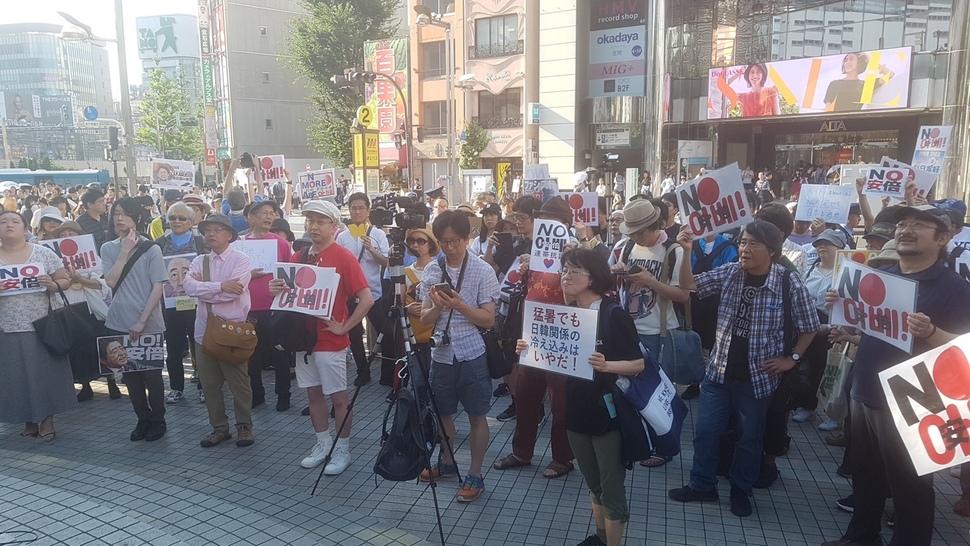 |
|
Japanese demonstrators opposed to Prime Minister Shinzo Abe and his trade policies gather in Tokyo on Aug. 4. (Yonhap News)
|
Japan’s trade measures against S. Korea have long-term economic consequences for Tokyo
South Korea-Japan relations appear headed into a long-term crisis of confrontation between equally matched powers after Japan fired an opening salvo of economic warfare with its decision to remove South Korea from its “white list.” While Japanese Prime Minister Shinzo Abe and hardline associates who have joined him in his “Korea-bashing” agenda appear to have the aim of dealing a blow to South Korean industry and bringing about a political capitulation from Seoul, analysts say the economic situation in Japan suggests that Abe himself is facing a ticking clock. For Abe, diplomacy and the economy have been key political assets. Over the years, he has drummed up support by fanning crises and negative opinion involving North Korea and Japan; when the North Korea-US negotiations and reconciliation with Beijing left this card unavailable to him, he opted to go on the offensive against South Korea instead. On the economic front, his “Abe-nomics” approach, which depends on unlimited quantitative easing and aggressive fiscal expenditures, produced results in the early going, helping to further raise his approval rate. The problem for Abe is that the illusory nature of Abe-nomics is becoming increasingly apparent, with the continued surfacing of growing trade deficit and retirement pension issues. His most pressing concern involves trade negotiations with the US. While the target of the US-Japan trade talks is to reach a conclusion in broad terms by around September, US President Donald Trump is pressing for major concessions from Tokyo on its agricultural market and other areas, with the talks having been put off until after the House of Councillors election in July in order to reduce the political burden on Abe. On Oct. 1, the Japanese consumption tax is scheduled to rise from 8% to 10%, with the resulting decline in domestic demand expected to deal a significant blow to the Japanese economy. Meanwhile, in the wake of its removal of South Korea from its white list, fears have been growing internationally that Japan is upsetting the global ecosystem in the high-tech information technology (IT) industry, including the area of semiconductors. Early October marks the deadline (90 days) for the decision on whether to grant approval to companies requesting permits to export items to South Korea following the semiconductor component and material export control measures announced by the Japanese government on July 4. The issues of violation of WTO regulations and overseas trust are poised to grow if Japan does not grant the export permits. In effect, the period from late September to early October amounts to a major economic deadline for Abe. Under the circumstances, observers suggested that for all of the apparent signs of long and careful preparation behind his export controls against South Korea, Abe also faces a number of vulnerabilities. The lack of consistency in Tokyo’s stance – with Abe and his associates citing “North Korea” and “sarin gas” as factors following the announcement of the export controls in early Japan, only to walk back the claims later – appears to be evidence of a lack of preparation. “Prime Minister Abe began his pressure campaign against South Korea from an unfavorable domestic and international position, without having made the necessary preparations to alter the geopolitical framework surrounding the Korean Peninsula,” said Kang Dong-kook, a professor at Nagoya University. “He may have been trying to rally supporters for the House of Councillors election and verify the continuation of the ‘1965 regime’ [of South Korea-Japan relations under their Claims Settlement Agreement] by dealing a blow against South Korea at a time when [Japan] holds an overwhelming economic advantage over South Korea ahead of the consumption tax hike in October,” Kang suggested. Growing concern among Japanese political circles Signs of dissension have also been evident within the Japanese government. “The situation right now is one where the Office of the Prime Minister, the Foreign Ministry, and the Ministry of Economy, Trade and Industry are all saying different things,” said Yang Kee-ho, a professor at Sungkonghoe University. “The Japanese Foreign Ministry is talking about a diplomatic situation, claiming that things could be resolved if South Korea offers a solution on the forced labor conscription issue, while the Office of the Prime Minister appears to hold a different position,” he said. “Within the Ministry of Economy, Trade and Industry, there’s been conflict between Minister Hiroshige Seko – a top Abe associate who has spearheaded the hardline measures against South Korea – and the other officials,” he added. Kang Dong-kook predicted, “While South Korea may suffer a bigger blow early on, over time there will also be a blow to the Japanese materials industry, which will lose South Korea as a major export market, as well as to Japanese businesses that use South Korean semiconductors, which will result in more critical attitudes from the Japanese business community and public.” “Japan will agree more readily to negotiations as the likelihood of South Korea securing alternative materials becomes more apparent,” he added. By Park Min-hee, staff reporter Please direct comments or questions to [english@hani.co.kr]





